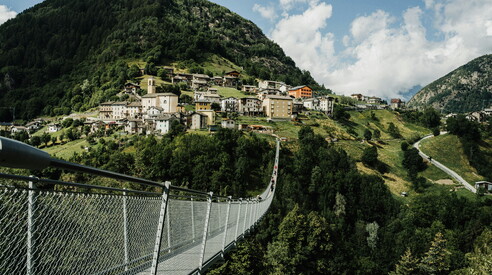Between impossible roads and ramshackle houses, this is Italy as seen by cultured visitors.


Photo by Fabrizio Coco on Unsplash
the stories
For over two hundred years, English-speaking authors have regularly visited Italy, leaving detailed written impressions. A collection of Tripadvisor reviews ante litteram.
On the same topic:
Tripadvisor may have been around for a quarter of a century, but English-speaking authors have been regularly visiting Italy and leaving detailed written impressions for over two hundred years. Their pages reveal that Trento is "one of the ugliest cities in the world in one of the most beautiful settings in the world" (Lawrence Ferlinghetti), Sondrio has "all the ugliness of a modern Italian city" (Edith Wharton), Piacenza is "an old, decayed, and gloomy city" (Charles Dickens), Fiorenzuola "dark, ancient, and sad" (Aldous Huxley), Torre Annunziata "truly the last place on earth" (Mark Twain), and, as for Catanzaro, "I had never seen a city so ruined" (George Gissing). What Gissing was doing in Catanzaro, and Huxley in Fiorenzuola, remains a mystery; Perhaps it's a symptom of the inexhaustible curiosity that drives the English and Americans, or more likely a testament to a great literary truth: the more we delve into details in search of beauty, the more we end up staring horror in the face. In summer, that horror is tourism, and English-speaking writers are quick to recognize this.
One hundred and fifty years ago, Henry James complained about overtourism at the Venice Lido (“on the other hand, the cuisine hasn't improved”), and a hundred years ago, Huxley imitated him regarding Forte dei Marmi ; nevertheless, they continued to visit the peninsula in droves and quickly realized that the main problem of traveling in Italy was getting there. John Dos Passos traveled from Cittadella to Bassano on a muddy, chaotic, and dirty road. David Herbert Lawrence dared to take the train in Sicily : two hours for fifty kilometers, then his sleeping car stalled for no reason in Messina and, to reach Syracuse, he took off on a contraption with rain pouring from the roof, while “the railwaymen cheerfully noted the accumulated delay on the board”; in Palermo, he tried to cross Via Maqueda, but slipped on its flagstones. Percy Bysshe Shelley traveled through Tuscany “in a carriage with almost no suspension, along a bumpy road.” Twain discovers that in Naples there are no sidewalks, or they are so narrow that one must walk in the street, while John Steinbeck, though accustomed to adventure, notes in Positano, terrified: "Italian traffic seems absurd. You can't guess what the driver in front, or behind, or beside you is going to do, and usually he does." It is in the lodgings, however, that the bewilderment of the cultured visitors (anthologized by Donzelli in the beautiful volume "Un caldo infernale," edited with encyclopedic meticulousness by Eleonora Carantini) reaches its peak. Dickens can't believe that in Genoa "it's possible to cram a makeshift hut into every nook and cranny," Nathaniel Hawthorne finds himself in a hotel in Incisa "similar to an Etruscan tomb," Huxley sleeps in Pietramala in a room without a fireplace, wearing all his woolen clothes, and Zadie Smith in Florence finds herself in an "uncomfortable bed with rough sheets, a creaking wardrobe, a straw-seated chair . No TV, no mini-bar, nothing to eat," and this is 2018, not 1818.
Which is when Shelley tries to visit the dungeons of the Doge's Palace in Venice, but finds them closed because it's a holiday – after all, Evelyn Waugh writes, "one of the most exasperating characteristics of Neapolitan coachmen is to nod happily at instructions, drive an elaborate and winding route until they reach the facade of the building I wished to see, and then, turning from their seats, smile amiably and say: 'Closed, sir.'" In return, they continually offer him the chance to watch "Pompeian dances" with naked girls. Twain, on the other hand, was taken to Christopher Columbus's house in Genoa, and "the guide, after we had remained a quarter of an hour in reverential silence, explained to us that Columbus hadn't actually been born there." Mary Shelley criticizes the gloomy and insolent coachmen of Trentino, and her husband retorts that in Capri "the guides were perfect savages." Even Edward Lear, one of history's most witty comedians, loses patience when he discovers that in Calabria, to get milk for breakfast, you have to "sit in the middle of the road" and "watch for the goats to pass." The greatest lover of Italian architecture, John Ruskin, blurts out, "At last far from the smells and filth of Italy." But the definitive review comes from Lawrence, an exhausted and desperate tourist ante litteram in Sardinia: "Italy has ruined Italy."
More on these topics:
ilmanifesto





